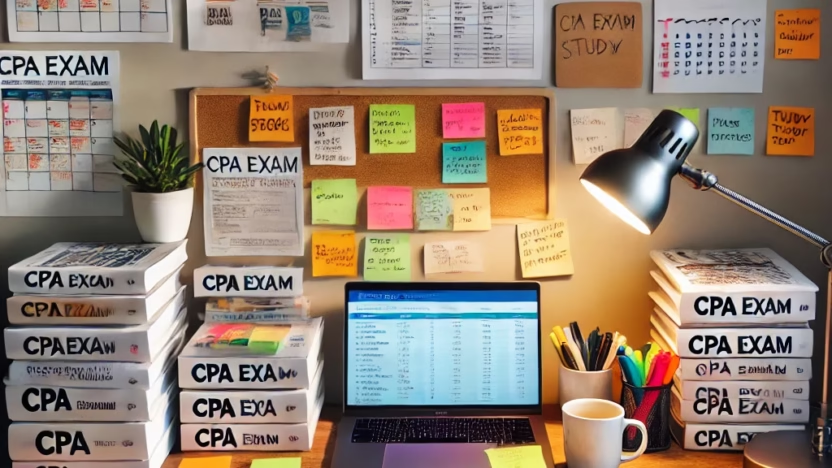Passing the Certified Public Accountant (CPA) exam is a challenging yet rewarding milestone for aspiring accountants. With four sections to tackle – Auditing and Attestation (AUD), Business Environment and Concepts (BEC), Financial Accounting and Reporting (FAR), and Regulation (REG) – a strategic approach to studying is essential. This guide outlines the best practices for CPA exam preparation, ensuring you can efficiently manage your time, retain information, and approach the exam with confidence.
Table of Contents
- Understand the Exam Structure
- Develop a Comprehensive Study Plan
- Choose the Right Study Materials
- Adopt Effective Study Techniques
- Time Management Strategies
- Prioritize Mental and Physical Health
- Utilize Exam Day Strategies
- Learn from Others’ Experiences
- Reassess and Adapt
- Conclusion
Understand the Exam Structure
Before diving into study materials, familiarize yourself with the CPA exam’s format. Each section consists of multiple-choice questions (MCQs), task-based simulations (TBSs), and written communication tasks (in BEC). Understanding the weight and type of questions in each section helps you allocate your study time effectively:
- AUD: Emphasizes audit procedures and ethics.
- BEC: Covers business concepts and written communication.
- FAR: Focuses on financial reporting standards and practices.
- REG: Involves taxation, ethics, and business law.
Develop a Comprehensive Study Plan
Set a Realistic Timeline
Aim to schedule and complete all four sections within an 18-month rolling window. Assess your availability and commit to a specific timeline for each section. Many candidates find it effective to spend 6-8 weeks per section, studying 15-20 hours weekly.
Break Down the Content
Use the CPA Exam Blueprints provided by the American Institute of Certified Public Accountants (AICPA). These blueprints outline the skills and knowledge tested in each section, enabling you to prioritize high-weight topics.
Establish a Routine
Consistency is key. Block out specific times for study sessions each day. Morning sessions can be especially effective for focused learning, while evenings might be better for review and practice.
Choose the Right Study Materials
Invest in a CPA Review Course
A high-quality CPA review course provides structured lessons, practice questions, and mock exams. Popular providers like Becker, Wiley, Roger CPA Review, and Gleim cater to different learning styles. Compare features, such as adaptive learning technology, video lectures, and access duration, to find the best fit.
Supplement with Additional Resources
Use resources like CPA exam prep books, flashcards, and online forums. Listening to CPA-focused podcasts or watching topic-specific YouTube videos can also reinforce learning.
Adopt Effective Study Techniques
Active Recall and Spaced Repetition
- Active Recall: Test yourself regularly on key concepts rather than passively reading notes.
- Spaced Repetition: Review material at increasing intervals to improve retention.
Practice, Practice, Practice
Complete as many MCQs and TBSs as possible. Simulating the exam environment helps build familiarity and confidence. Focus on understanding why an answer is correct or incorrect.
Use Mnemonics and Memory Aids
For complex concepts, mnemonics and acronyms can simplify memorization. For example, use “FAR” to remember Financial Accounting and Reporting topics.
Review Weak Areas
Use analytics from your review course to identify weak topics. Dedicate extra time to these areas while continuing to review stronger topics to maintain balance.
Time Management Strategies
During Study
- Set daily and weekly goals to stay on track.
- Use a timer to maintain focus during study sessions (e.g., the Pomodoro technique).
On Exam Day
- Allocate time wisely across question types. For example, budget approximately 1.5 minutes per MCQ and 15-20 minutes per TBS.
- Leave time for reviewing flagged questions.
Prioritize Mental and Physical Health
Stay Active
Incorporate regular exercise to reduce stress and improve focus.
Eat Well and Sleep Enough
Nutrition and sleep significantly impact cognitive function. Aim for balanced meals and 7-8 hours of sleep per night.
Take Breaks
Avoid burnout by scheduling short breaks during study sessions and longer breaks weekly to recharge.
Utilize Exam Day Strategies
- Arrive early to the testing center to acclimate to the environment.
- Bring required identification and materials.
- Use scratch paper to jot down formulas or key points before starting.
- Stay calm and focused, managing anxiety through deep breathing techniques.
Learn from Others’ Experiences
Engage with fellow CPA candidates through study groups or online communities like Reddit’s r/CPA or the Another71 forum. Sharing tips and experiences can offer new perspectives and motivation.
Reassess and Adapt
After each section, evaluate what worked and what didn’t. Adjust your study methods for the remaining sections to optimize efficiency.
Conclusion
The CPA exam is a rigorous test of your accounting knowledge and dedication. By creating a structured study plan, leveraging quality resources, practicing diligently, and maintaining a healthy lifestyle, you can maximize your chances of success. Remember, persistence and adaptability are your allies in this journey. Stay focused, and soon, you’ll join the ranks of licensed CPAs.




